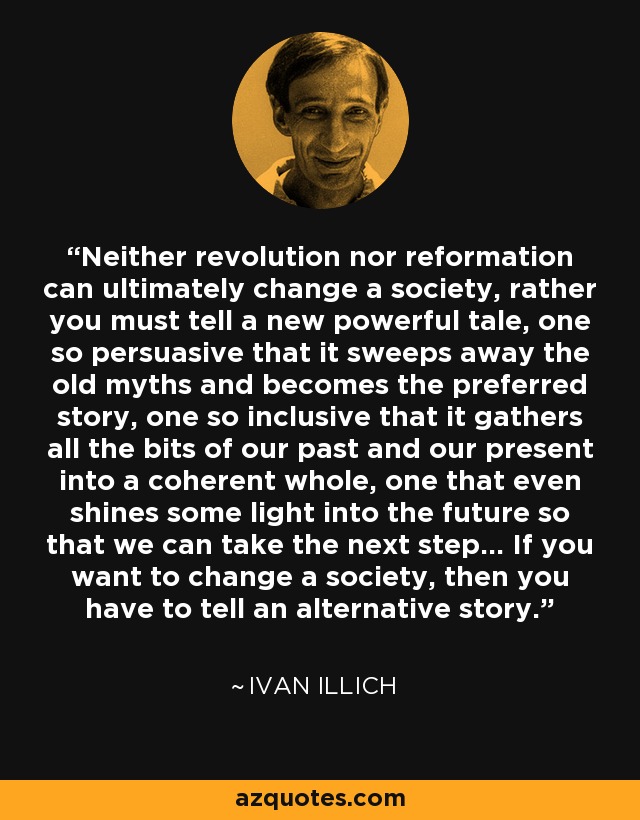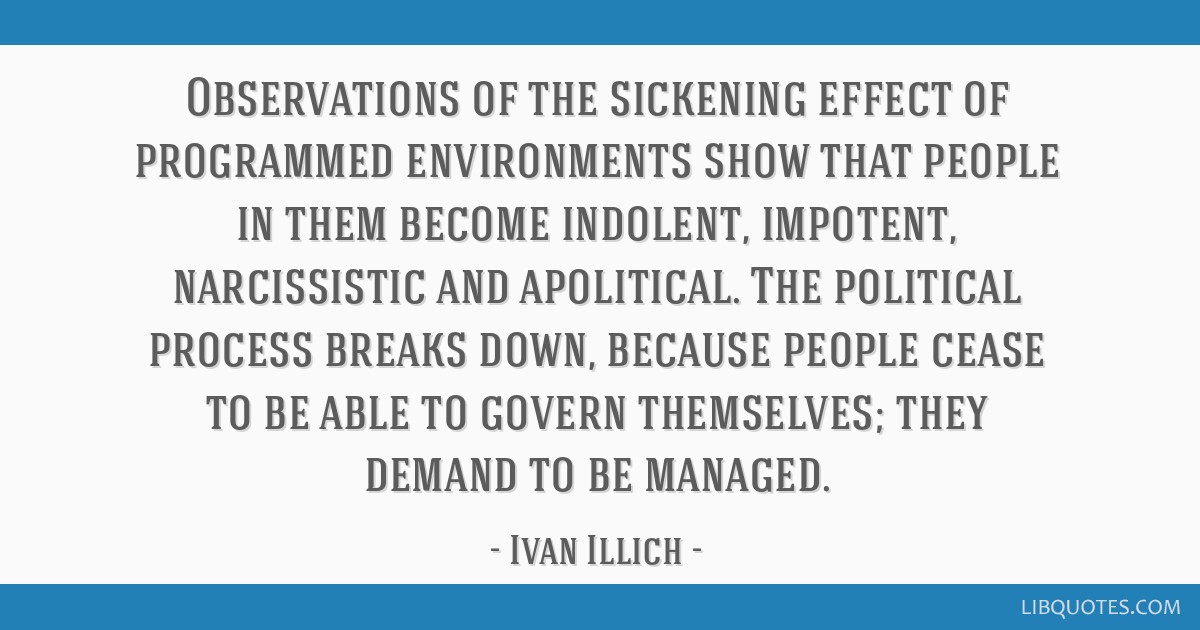
Ivan Illich
Wikiquote
https://en.wikiquote.org/wiki/Ivan_Illich
Ivan Illich Resources
http://paxonbothhouses.blogspot.com/2018/04/ivan-illich-resources.html

"The Religious Underpinnings Of Ivan Illich's Thought"
http://paxonbothhouses.blogspot.com/2013/12/the-religious-underpinnings-of-ivan.html

Ivan Illich
Wikipedia
http://en.wikipedia.org/wiki/Ivan_Illich
"New Scare City"
http://backpalm.blogspot.com/
"Rhetoric of Ivan Illich"
http://rhetoricofivanillich.blogspot.com/
("Rhetoric" provides useful notes concerning the themes of Illich's books,
including "Gender.")
The People's Priest," The American Conservative
http://www.theamericanconservative.com/articles/the-peoples-priest/
Eulogy-Obituary, Gov. Jerry Brown (a friend of Illich)
http://www.wholeearth.com/issue/2111/article/183/remembering.ivan.illich
Obituary, The Telegraph
http://www.telegraph.co.uk/news/obituaries/1415202/Ivan-Illich.html
NYU Obituary
http://www.nyu.edu/projects/nissenbaum/papers/memoriam.pdf
"Ivan Illich: Intellectual Titan"
http://paxonbothhouses.blogspot.com/2012/08/ivan-illich-intellectual-titan.html
"Ivan Illich: Four Of His Keenest Insights"
http://paxonbothhouses.blogspot.com/2013/12/ivan-illich-four-of-his-keenest-insights.html
"The People's Priest," An Ivan Illich "Obituary/Review" From The American Conservative
http://paxonbothhouses.blogspot.com/2013/12/the-peoples-priest-ivan-illich.html"New Scare City"
http://backpalm.blogspot.com/
"Rhetoric of Ivan Illich"
http://rhetoricofivanillich.blogspot.com/
("Rhetoric" provides useful notes concerning the themes of Illich's books,
including "Gender.")
The People's Priest," The American Conservative
http://www.theamericanconservative.com/articles/the-peoples-priest/
Eulogy-Obituary, Gov. Jerry Brown (a friend of Illich)
http://www.wholeearth.com/issue/2111/article/183/remembering.ivan.illich
Obituary, The Telegraph
http://www.telegraph.co.uk/news/obituaries/1415202/Ivan-Illich.html
NYU Obituary
http://www.nyu.edu/projects/nissenbaum/papers/memoriam.pdf
"Ivan Illich: Intellectual Titan"
http://paxonbothhouses.blogspot.com/2012/08/ivan-illich-intellectual-titan.html
"Ivan Illich: Four Of His Keenest Insights"
http://paxonbothhouses.blogspot.com/2013/12/ivan-illich-four-of-his-keenest-insights.html

IVAN ILLICH:
VIVE LA DIFFERENCE!
By Arlie Russell Hochschild; Arlie Russell Hochschild, an associate professor of sociology
at the University of California, Berkeley, is the author of ''The Managed Heart: Commercialization of Human Feeling,'' to be published in the fall
.
Published: January 30, 1983
GENDER By Ivan Illich. 192 pp. New York: Pantheon Books. $11.95.
IN certain remote valleys of the French Pyrenees where living patterns of the 11th century persisted into the mid-19th, a farm woman would serve her husband's meal and then eat standing up, finishing his leftovers. A man might tutor his wife as he did his children. He would say ''tu'' to her, but she had to say ''vous'' to him. In prayers, a man often asked God or the saints to save his chestnuts, his turnips or his cattle before mentioning his wife or daughters. No proverbs honored women. The birth of a boy was greeted by gunshots and rejoicing, while the birth of a girl was cause for embarrassment. A father would try to baptize his daughter as quietly as possible (no bells were rung in certain regions) and without expense. In places where the old ways were preserved, men wore no mourning when their wives died. Upon the death of a man in many Ardeche villages, a longer death knell was pealed and on bigger church bells than in the case of a woman.
You will not find any of this in Ivan Illich's new book, ''Gender.'' The reason you won't is that Mr. Illich sees the very act of comparing leftovers to food, ''tu'' to ''vous'' and bell to bell as a sign of the sad fact that we have lost a ''gendered'' way of looking at things. We draw ''invidious comparisons.'' Mr. Illich is trying to help us ''recover'' from that way of seeing.
In ''Deschooling Society,'' ''Medical Nemesis,'' ''Shadow Work'' and other books, Ivan Illich - former parish priest, founder of the Center for Intercultural Documentation in Mexico, now lecturer in medieval history in Germany - established himself as a distinguished maverick critic of self-interested professionals and overdeveloped societies. Taken as a whole, his work expands Max Weber's view of how modern bureaucracies can become ends in themselves that are harmful to people. To this idea he has added a deep and Jesuitic reverence for the past and some watered-down Marx and applied the combination to schools, hospitals, churches and society in general. Though he has seemed to maintain an active disinterest in practical reform, he has offered a provocative and original way to see what's wrong. I wish I could say the same for ''Gender,'' but I cannot.
Before I explain why, let me review what the book says. For Mr. Illich, European history breaks into three periods. The first, which runs from the mists of prehistoric time to about the 11th century (with variations according to locale), is the reign of vernacular gender. In this period, according to Mr. Illich, there was no concept of the ''human being'' who secondarily happened to be male or female; there was only the idea - and the actuality - of men and women, each making separate ''gendered'' contributions to a life of subsistence farming. Women used exclusively female tools in special female ways; for instance, they cut bread with the knife facing them, while men cut it with the knife facing away. Women inhabited female space, dreamed female thoughts and had female feelings. They took care to stay on their side of a symbolic ''gender divide,'' and men did the same. Living so differently and separately, men and women did not compare themselves to each other. And because there was no ''lifelong invidious comparison,'' there was no envy.
Next came the period of broken gender (the 11th to the 17th century, roughly), in which tools were developed that could be used to produce salable goods for distant markets. Gradually the gender divide in tool use and other more ephemeral areas broke down.
In the third period, the regime of economic sex (from the 17th century to the present), there arose the idea of ''people'' who happen to be of different sexes. The new concept of personhood gradually allowed the sexes to use tools interchangeably. The gender divide disappeared, and the comparisons between men and women opened the door for ''modern'' envy, which became for the first time a ''problem.'' (Here Mr. Illich draws on the worst of Marx and Engels; that is, all was well for women before capitalism.) Of these three periods, he prefers the first: A strong gender divide is associated with beauty and high civilization; a weak or absent gender divide is associated with chaos, decadence and economic individualism.
IN the lining of this history we find some remarkable claims. For women, life was better in premodern times. Gender equality is ''impossible'' in today's world. What little equality exists profits only a tiny elite - whose idea it exclusively is. Men and women are so profoundly different Mr. Illich implies that the gender divide would suit us better. In all his earlier books, he talked about the present and what should be done, but in this one, he throws up his hands and says in effect, ''I am not speaking about the present and I have no solutions.''
Mr. Illich speaks about the ''illusory goal of equality,'' of ''the fanciful goal of equality,'' of ''the pipedream'' of equality. As evidence, he fixes on the fact that American women have earned 60 percent of what American men have for the last hundred years. He seems to take this figure as an implacable, apolitical fact of life. And is the wage gap unchangeable? In Australia, governmental wage tribunals have the authority to set minimum wages in various occupations; between 1964 and 1975, the change in minimum-wage policy led the average female wage to rise from 59 percent to 77 percent of the male wage. But we get the sense that Mr. Illich isn't interested in examining the fact that this male/ female earning ratio doesn't hold true around the world; he simply knows that equality is impossible
HIS 125 footnotes with references in three languages, a separate (but equal) book in themselves, give us the sense that he has read a lot. But we also get the sense that Mr. Illich is using his erudition to calm the queasiness we come to feel about his scholarship. For even when he cites evidence, he doesn't examine it in a scholarly way. He cites, for example, David Sabean's study of divorce proceedings in a Lutheran village in Wurttemberg, Germany, between 1800 and 1850. This source, he tells us, shows that after cash crops began to be produced in the area, the court records document that women complained for the first time about their men bossing them around. (When they had their own gendered sphere men left them alone.) What Mr. Illich does not tell us is even more interesting: After the introduction of cash crops in Wurttemberg, wife beating ceased to be one of the most common grounds for divorce.
Mr. Illich says that we cannot really talk about dominance in the old ''gendered'' world, because in that world dominance was one thing to men and quite another thing to women. Here a conceptual dodge gives an O.K. to the empirical one. Because each gender has different ways of dominating, Mr. Illich seems to believe that comparing male to female ways would be like comparing apples to oranges. Instead we are asked to stand still while the fog rolls in over this topic via the concept of ''ambiguous complementarity.'' But can the problem of dominance be set aside so easily? What would we say if someone described the antebellum South as a ''raced'' society, with ''raced'' tools (the hoe for blacks, the quill for whites) and ''raced'' ways of walking, dancing and thinking, and then went on to assert that blacks and whites worked together like right and left hand, held together by ''ambiguous complementarity''?
Men and women are so very different, Mr. Illich tells us, that ''the special space (and the time that corresponds to it) that sets the home apart from nest and garage is engendered only by women, because it is they who bear living bodies.'' In the modern apartment built according to ''unisex'' standards, men feel out of place but ''women are doubly out of place ... and they clearly say so. The encroachment and usurpation of normative space frustrates the flesh of women as it does not and could not affect men's. ... Such designs place women, in their flesh and rhythms, in double jeopardy: Their potential contribution to homemaking is frustrated, and they are yanked out of their proper gender context; in both respects they suffer more than men.'' And what about modern men? Mr. Illich refers contemptuously to the ''occasional husband domesticated for washing the dishes.''
SO why did he write this book? I would guess because he wants to add women to his moral constituency favoring a return to a precommercial age. To appeal to women he must have felt it necessary to lure them away from any aspirations for equality in the modern world - or really in any world at all. In so doing he has joined the current backlash against feminism. He shows that the backlash does not have to base its case for the subordination of women on lactation or hormones, or even on grounds of culturally caused inferiority. It can now base that case on how bad things are for women today and on an image of the toughies they were when they had their own turf. This is too bad, because Mr. Illich's material bears on some important questions: Should all the old female culture be abandoned or would women be happier keeping more of it alive, which they could then share equally with men? What sort of society should women want to be equal in?
In the last phrase of his book, Mr. Illich praises an ''openness to surprise.'' And this his readers will need. Officials of the Catholic Church will be surprised to see themselves accused of helping to break down the gender divide. Scholars of sex discrimination will be surprised to see their work cited to support the contention that sexual equality is out of the question. And surely those 19th-century women of the Pyrenees, if they could have read ''Gender,'' would have put down their leftovers and laughed in amazement.
Gender (Open Forum): Ivan Illich: 9780714527581: Amazon.com: Books
Dec 25, 2006 - Gender (Open Forum) [Ivan Illich] on Amazon.com. *FREE* shipping on qualifying offers. The break with the past, which has been described by others as the ...
Gender by Ivan Illich — Reviews, Discussion, Bookclubs, Lists
www.goodreads.com/book/show/253079.Gender
Rating: 4 - 33 votesGender has 33 ratings and 6 reviews. Eric said: An attempt (amazingly successful, I think) to critique the entire modern system of human relations withou... Gender - Ivan Illich - Google Books
Discusses sexism and economic growth, women and poverty, sex role, marriage, child rearing, cultural stereotypes, and the image of women.Rhetoric of Ivan Illich
rhetoricofivanillich.blogspot.com/
Every time I do I learn new things from Ivan Illich as well as new things from my ... We think gender and division of labor is primitive because ALL subsistence ...












Illich decided to forgo medical treatment for this growth on his right cheek.



Alan: The sentiment above would be more "palatable" if Illich had said: "By raising expectations that we can always be cured by "heroic medicine" in the form of advanced pharmaceuticals, powerful medical technology and "new and improved" treatments, many (perhaps most) people will stop taking good care of themselves in the hope that "they get lucky." As a direct consequence of these expectations (whether conscious or unconscious) many people will (to take one example) smoke 3 packs a day hoping they won't get sick, but if they do become gravely ill, heroic intervention will save their bacon.




















Alan: "Tools For Conviviality" may be Illich's most important book although most people would priortize the importance of "Deschooling Society," also an excellent book.
Over time, "Gender" -- Illich's least popular book, and for many a book based on an offensive premise -- may emerge as one of his best.

No comments:
Post a Comment